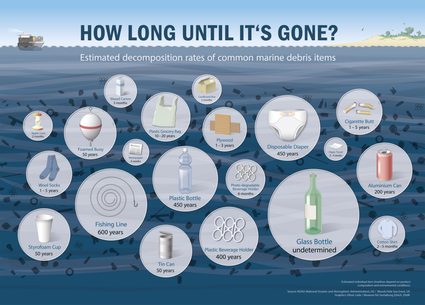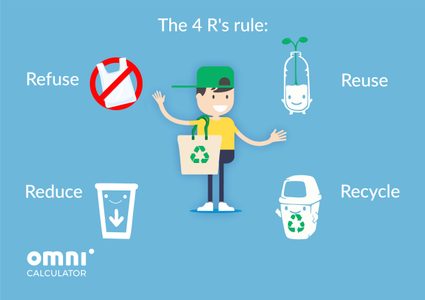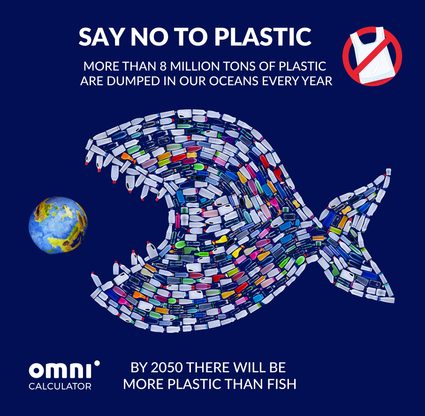Plastic Footprint Calculator
The ubiquity of plastic is a terrifying fact – it's everywhere around us: in the ground and in the oceans, in our food, and in the water we drink. More than 8 million tons of plastic are dumped in our oceans every year; by 2050, we are going to have more plastic waste than fish. But what can we do about this? Isn't this a problem just for big companies and industries? Of course not. Remember that little drops make the mighty ocean! Inform yourself and others, be aware, change your lifestyle, and take action.
This plastic footprint calculator was created to help – find out what your plastic usage will be in a year's time. We encourage you to quit some bad habits and reduce the plastic footprint - believe it or not, but we can live without all these plastic bags, disposable cups, straws, and plastic bottles. If you are concerned about our future and the Earth we pass on to the next generations, read on to find more information about plastic pollution.

How long does it take for plastic waste to decompose?
It is estimated that only 5-10 % of the world's plastic is recycled. More than 30% of it ends up in a landfill and around one-third – in the oceans. How embarrassing. We've even created a new continent - a mass of plastic waste the size of Europe. Have a look at this National Geographic about plastic pollution - we are certain that after watching it, you'll feel the need to change the world, step by step.
Did you know that microplastic – if inhaled or eaten by a person – increases the risk of cancer, asthma, infertility, and mental disorders?
So, how long does it take for plastic garbage to decompose? Scientists estimate that plastic can take more than 500 years to degrade, but this time can be shorter for specific items:
- Plastic bags 10-1000 years;
- Grocery bags 10-20 years;
- Foam plastic cups - 50 years (have a look at this video: );
- Plastic disposable cups and plates - 400 years;
- Disposable diapers - 450 years; and
- Plastic bottles - 450-500 years.

The 4 R's rule: Refuse, Reduce, Reuse, Recycle
The 4R's is a rule to minimize and manage waste – it's fundamental for those who really care about the world we are living in. How do you start?
-
Refuse – Turn down all disposable plastics, such as coffee cups, straws, plastic bags, single-use cutlery, and stirrers. You are using it for seconds or minutes, but it will outlive you by a couple of hundreds of years.
-
Reduce – Choose the products with the least possible plastic waste: choose paper-wrapped products over those packaged in plastic, and buy biodegradable cotton swabs instead of plastic ones (this innocent stick is one of the top ten forms of beach litter, polluting the oceans) and avoid plastic microfibers in things like synthetic clothing.
-
Reuse (and repurpose) – Use plastic containers as many times as possible. Take your lunch in a Tupperware-type box, reuse your non-toxic, durable straw, and take a plastic bottle with you. Repurpose old plastic stuff – awaken your inner child and create a cool flower pot or a bird feeder.
-
Recycle – If the options above don't work, stick to the last one. Recycling plastic (and other materials) should be our everyday habit. Buy products that are made of recycled materials, choose ones that are easy to recycle, and rinse your waste before throwing it into a recycling bin to avoid waste contamination, which makes recycling impossible.
Sometimes it's even called the 5 R's rule – the last R standing for Rot, Repurpose or Remove, depending on the source.

How to calculate plastic footprint?
If you are wondering what your yearly plastic consumption is, check out the plastic footprint calculator:
-
Start with your everyday needs and shopping habits. How many plastic bags do you take when grocery shopping? How many water bottles do you buy each week? Count all of them and type the values into the proper boxes. Let's assume that you buy 3 PET bottles per week (coke and water), 5 plastic bags (Refuse rule!), 8 food wrappers, and 2 yogurt containers.
-
Let's move to the laundry, cleaning, and bathroom. Type the values that describe your needs, e.g., 4 cotton swabs/week and 4 detergents, 2 shampoo bottles, 2 refill packets per half year. Add the toothbrushes and toothpaste – in our example, it's 3 per year for both of them.
-
Add all disposable wastes and takeaway containers. Take-away lunch four times per week (don't forget about the cutlery pieces), grabbing a coffee on the go twice per week, a couple of drinks with straws, and a plastic plate on a Sunday barbecue... Urgh, it's a lot. We know it's quick and convenient, but it's the most shameful plastic waste you can easily avoid. Rethink, refuse a straw, reduce the trash, and bring your own container every time you can.
-
Plastic footprint calculator will add all the plastic you used throughout the year. In our example, it summed up to 64 pounds (29 kg), and the average for a European citizen is 68 pounds (31 kg). That's a heck of a lot of plastic! To make it worse, we can tell you that this footprint is still relatively small if you are living in the US: the average American throws away approximately 185 pounds (84 kg) a year! Multiply this by 300 million US inhabitants, and you will understand why plastic pollution is such a pressing issue.
Remember that the plastic footprint calculator features only the basic products – your plastic footprint may be much higher if you add some other products, e.g., plastic furniture, boxes, crates, buckets, flower pots, bowls, or any other plastic items.
How can I reduce my plastic footprint?
Well, you can do a lot about that. Take the 4 R's pledge and start from small things:
-
Refuse the plastic bags and bring your own cloth bags. Keep a cotton bag in your backpack, in the car trunk, next to the front doors – where it's easy to notice and grab it when you're going shopping.
-
Bring your mug. In only the UK, 7 million disposable coffee cups are used every day. On top of that, they need to be recycled in specialized facilities, as they are made not from standard paper but from paper lined with plastic to provide waterproofness. It's estimated that less than 1% of disposable cups are recycled. Not to mention the plastic lids, sleeves, or stirrers.
-
Refuse the plastic straws or change to those made from paper or steel. For most people (excluding hospital patients), drinking with a straw is not a must. Did you know that plastic straws make up ~4% of plastic trash by piece? Of course far less by weight, as they weigh approximately 0.18 oz (0.5 g), but this doesn't stop them . Take this small step and boycott plastic straws today.
-
Use refill packets instead of buying new bottles every time. Whenever possible, choose products that generate less plastic waste. You can check with our plastic footprint calculator how much plastic you will 'save' when using refill packets. It's around four times less, as detergent bottles are usually made from heavier HDPE (high-density polyethylene).
-
Carry your own water bottle. Choose a reusable plastic or glass bottle. Your footprint will be reduced, and you will be shocked at how much you can save if you drop the bottled water! Check our tap water calculator to find out what substantial savings result you can get from such a tiny change.

Don't wait any longer. Reuse or repurpose plastic change your habits today: Check our kaya identity calculator to understand how to quantify our impact, or find out what's your flight carbon footprint and try to live a greener life.
FAQs
How do I calculate my plastic footprint?
To calculate your plastic footprint, consider the following sources of pollution:
-
Single-use plastic products for food and beverages.
-
Packaging and plastic containers for cleaning and hygiene products.
-
Food packaging from the grocery store.
-
On a longer timescale, toys and larger pieces of plastic.
-
Add up the weights of all the items you used.
-
Multiply the quantities according to the timeframe (e.g., 52 times if you counted the items used in a week) to measure how much plastic you use each year.
Why is the plastic footprint important?
Plastic is an excellent material: moldable, strong, and durable. Maybe too strong and durable. The plastic you use rarely gets recycled (as it's tough to do so) and takes a lot of time to degrade into something not as detrimental to the environment.
The plastic you use today loiters around for more time than you'll do: be conscious about your plastic footprint, the amount of plastic you use and dispose of, and try to reduce your impact on the Planet!
How much plastic is recycled?
Less than 10% of the plastic we throw away is recycled. Why?
-
There are many types of plastic, and we can recycle only some of them.
-
Plastic recycling is energy-intensive, and waste transportation is even more.
-
Plastic segregated by people is often not clean enough to undergo recycling.
Most of the time, the best strategy is to reduce the use of plastic, more than betting on recycling it!
How do I reduce my plastic footprint?
To reduce your plastic footprint, follow the four "R"s rule:
-
Refuse – If you can, say "no" to plastic. You can bring your own cup to the coffee shop!
-
Reduce – Choose the products and companies that reduce their use of plastic.
-
Reuse – Avoid single-use plastic, use your bags till they break, and wash all your containers!
-
Recycle – If you have to throw away something, segregate it and give it a chance to be recycled!